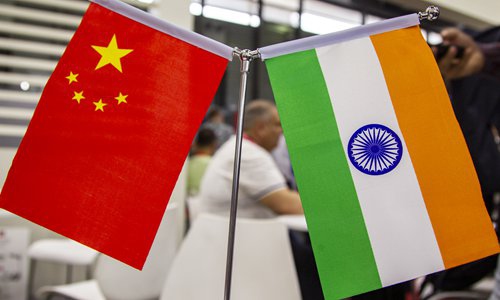India's new FDI restriction a bitter pill to swallow for its own manufacturing
Source:Global Times Published: 2020/4/22 22:48:40

Photo: VCG
If the coronavirus pandemic has exposed anything about India, it is that there is a huge manufacturing gap between the South Asian nation and China. While India still needs to buy medical supplies from its neighbor to meet its own domestic demand, China, with its strong manufacturing sector, is already able to ramp up its production capacity of medical goods and equipment to support both itself and the rest of the world.However, the Modi government has chosen to turn a blind eye to this fact, and only sees the COVID-19 crisis as a reason to tighten foreign investment rules. While India's new policy on restricting foreign direct investment didn't mention China in detail, Chinese investment is apparently the target of the new order, which is aimed at curbing so-called "opportunistic takeovers of Indian companies," according to the Department for Promotion of Industry and Internal Trade.
It is understandable that some in India may worry that China could take the opportunity of the business downturn caused by the coronavirus to acquire Indian companies and take control of some Indian sectors, but such fears are entirely unnecessary. Existing policies are already sufficient to allow the government to protect its companies and industries in a more targeted approach.
The one-size-fits-all restriction on Chinese investment will only backfire, particularly on India's manufacturing sector. In a foreseeable scenario, Chinese companies are expected to face tighter scrutiny in future investment in India. And such a deterrence will work on both sides, meaning Indian companies will shun cooperation with Chinese manufacturing, while Chinese manufacturers will avoid investing in India.
Recent reports have suggested some Japanese and South Korean companies are looking at the possibility of relocating to India. But still, China's importance to India's manufacturing development is incomparable in terms of both investment scale and technical transfer.
While the coronavirus disruption in China has brought to light the hope that India could become the next manufacturing hub, India is also one of the economies hardest hit by the virus due to supply chain disruptions. India must now accept the fact that China is indispensable to its future if it wants to become the world's next manufacturing center. And since it will take a long time for India to achieve that ambition, strengthening cooperation with China by creating favorable conditions for Chinese manufacturers is a must, at least in the short and medium terms. Any move away from that direction will only put its manufacturing development on a bumpy road in the long run.
Meanwhile, India is not the only choice for the extension of China's industrial chain. Many Chinese manufacturers still have plans to expand their overseas investments after the pandemic ends. If it is now risky to go to India, they will certainly turn to Southeast Asia, which, by comparison, appears more willing to accept a shift of low-end manufacturing from China.
Posted in: GT VOICE